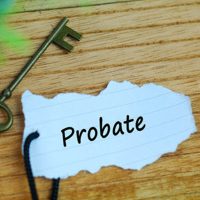How Do You Tell If an Asset Is Probate or Non-Probate?

An important task in Florida estate administration is distinguishing probate and non-probate assets. An estate consists of a deceased person’s probate assets. Other assets that a person owned, co-owned, or controlled may be classified as non-probate assets. Only probate assets are subject to administration under a person’s will, or in the absence of a valid will, according to Florida intestacy law.
So how can you tell if a given asset is probate or non-probate? Here are a few basic questions that can help you determine the answer.
How Is the Asset Titled?
Probate assets are solely titled in the name of the deceased individual. Generally speaking, if there is any co-owner who has survivorship rights, then it is a non-probate asset. For example, if Jessica had a bank account in her sole name, then it is a probate asset of her estate. But if she had a joint bank account with her son Mark, then it is a non-probate asset, as Mark automatically receives full ownership upon Jessica’s death.
Similarly, if an asset belongs to a revocable trust created by the deceased person during their lifetime, it should be titled in the name of the trust or the trustee. This is commonly done with real estate, such as a home, or motor vehicles.
Is There Already a Named Beneficiary?
Many non-probate assets have a “payable on death” or “transfer on death” beneficiary. A good example of this is a retirement account. Most such accounts require the owner to name a beneficiary. This beneficiary automatically receives the account after the original owner’s death. Such transfers occur outside of probate, hence the accounts are classified as non-probate assets. (The exception would be if the owner named their own probate estate as the beneficiary.)
Is There a Joint Tenancy–or a Tenancy in Common?
When two or more people own real estate, they can hold it as joint tenants or as tenants in common. A joint tenancy is where each person has an equal interest in the property, and upon the death of one owner, their interest automatically transfers to the survivor. Married couples often hold property as joint tenants (which is also called a tenancy by the entirety), but anyone can structure their property ownership in this manner.
If the co-owners are tenants in common, however, they each hold a separate interest in the property. For example, say Joseph and Sierra co-own an apartment building as tenants in common. Joseph owns a 60-percent interest while Sierra owns the remaining 40-percent interest. Neither has survivorship rights in the other’s share. So if, say, Joseph dies first, then his 60-percent interest would pass as part of his probate estate.
Speak with a Pompano Beach Probate vs. Non-Probate Assets Lawyer Today
Separating probate from non-probate assets is often a divisive legal issue when administering a Florida trust or estate. A qualified Pompano Beach probate vs. non-probate assets lawyer can offer you valuable advice and guidance in this area. Contact Mark R. Manceri, P.A., today to schedule a consultation.

 Mark R. Manceri, P.A. is a boutique law firm that specializes in Estate, Trust and Guardianship litigation. These matters include Will and Trust contests involving lack of capacity, undue influence, forgery, improper execution and tortious interference...
Mark R. Manceri, P.A. is a boutique law firm that specializes in Estate, Trust and Guardianship litigation. These matters include Will and Trust contests involving lack of capacity, undue influence, forgery, improper execution and tortious interference...